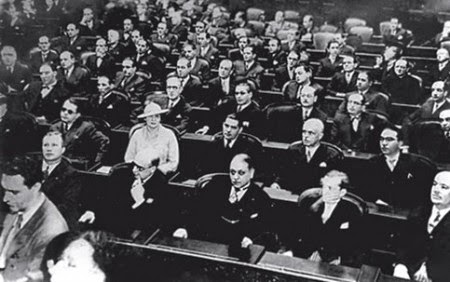The inequality between genders is present in different aspects of
life in society, including politics. Historically, this is a sector dominated
by men, which can be explained, on the one hand, by the traditional roles of
gender; and, on the other hand, by the exclusion promoted by the political
field itself (Secretaria de Política para as Mulheres, 2014).
Although the Brazilian Electoral law states that at least 30% of the
candidates must be women, in the 2014 Brazilian general elections, among 13,642
candidates, only 3,955 were women; which represents 28.99% of the total
(Tribunal Superior Eleitoral, 2014).
In addition to the insufficient number of female candidates, the
parties do not invest at campaigns of women candidates as much as they invest
at campaigns of men candidates. As consequence the imbalance continues. Despite
the fact that women represent 51.1% of the Brazilian population, they occupy
only few federal elective political positions, as showed bellow:
• Among the 27 states’
governors, only 2 are women
• Among the 513
Deputies, only 45 are women
• Among 81 Senators,
only 10 are women
(Data: Supreme Electoral Court of Brazil)
(Data: Supreme Electoral Court of Brazil)
The increase of number of female politicians is important to allow
women to speak for themselves and, thereby, enlarge the plurality of
“power-discourse” (Harvey, 1989). When parties do not
provide the conditions to women reach power, they are denying pluralism and
consequently decreasing the acceptance that other voices, beyond male ones, are
authentic and legitimate.
Therefore, the supremacy of men in politics is a way to maintain the
traditional role of gender and the division of labour. In this sense, the unequal distribution of political power affects other fields of society life
that go beyond politics. For this reason, this issue deserves attention of
Governments and citizens.
 |
| Carlota Queirós (1892-1982) First female Deputy in Latin America |
________________________________________________________________________________________
Harvey, David. The condition of postmodernity. Vol. 14. Oxford: Blackwell, 1989.
Secretaria de Política para as Mulheres (2014). Mais mulheres no poder
[Available at <http://www.mulheres.gov.br/mais-mulheres-no-poder/>]
[Accessed at 15 October 2014].
Tribunal Superior Eleitoral (2014). Estatísticas
Eleitorais 2014. [online] [Available at < http://www.tse.jus.br/eleicoes/estatisticas/estatisticas-candidaturas-2014/estatisticas-eleitorais-2014>]
[Accessed at 15 October 2014].
That's a bit weird since we have a woman as president, right? Even before de USA! For the past few years I have read a lot about feminism and sexism. I believe I have always been a feminism because I truly believe in gender equality but I have never been active as I feel I am now. Anyway, on the 1st round of the elections I voted only for candidates from PSOL. I was going to vote for Marcelo Freixo for state deputy(?) but I knew he would be elected, so I voted for a woman from the same party, she end up not being elected but I felt like I did my share.
ReplyDeleteIt's importante to have more woman taking politic decisions, not only to reach gender equality, but also for us woman to feel we are being truly represented.
Great blogpost!The truth is that this inequality is also present in many other countries as well, but i was pretty imressed by the statistics that you gave. I totally agree that government should act in order to change this situation and promote more fficiently the role of women in politics.The involvement of government could be a major thing in a campaign focused on change. Thus the approach when it comes to ToC should focused on the institutional level.Nevertheless as this issue is affected by the views people have about the role of men and women in society it would be wise to work as well on an individual level.
ReplyDelete